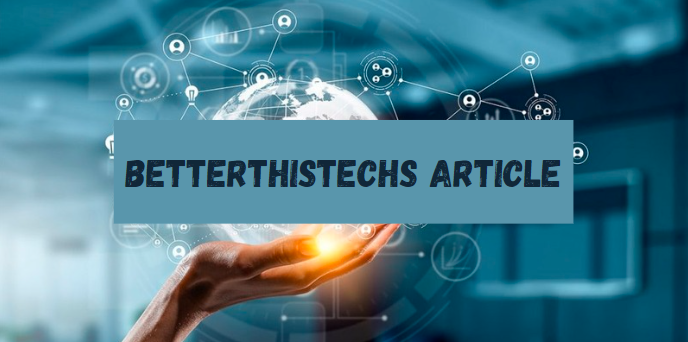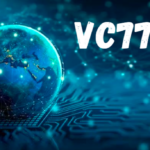The “betterthistechs article” encapsulates the ongoing journey towards technological advancement and innovation. In an era defined by rapid digital transformation, this article aims to provide a comprehensive understanding of the driving forces behind technological progress, the impact on various sectors, and the future landscape of tech development.
This in-depth analysis will offer valuable insights for tech enthusiasts, industry professionals, and anyone interested in the dynamic world of technology.
Introduction
The “betterthistechs article” symbolizes the relentless pursuit of technological enhancement. As we navigate through the 21st century, technology has become an integral part of our daily lives, influencing how we work, communicate, and interact with the world.
This article delves into the various facets of technological advancement, exploring its significance, key areas of development, and its far-reaching impact on different industries.
The Importance of Technological Improvement
Technological improvement is crucial for several reasons. It drives economic growth, enhances the quality of life, and solves complex problems that were previously insurmountable. As technology evolves, it opens up new opportunities for innovation, efficiency, and productivity.
The “betterthistechs article” highlights these aspects, emphasizing the importance of staying at the forefront of technological advancements to maintain a competitive edge in the global market.
Key Areas of Technological Advancements
Artificial Intelligence and Machine Learning
Artificial Intelligence (AI) and Machine Learning (ML) are at the forefront of technological innovation. AI involves the creation of systems capable of performing tasks that would normally require human intelligence, such as visual perception, speech recognition, decision-making, and language translation.
Machine Learning, a subset of AI, focuses on the development of algorithms that allow computers to learn from and make predictions based on data.
Impact of AI and ML
- Healthcare: AI is revolutionizing healthcare by enabling personalized medicine, improving diagnostic accuracy, and facilitating advanced research.
- Finance: Machine learning algorithms are used for fraud detection, risk management, and personalized financial advice.
- Transportation: Autonomous vehicles and smart traffic management systems are becoming a reality thanks to AI and ML.
Internet of Things (IoT)
The Internet of Things (IoT) refers to the interconnection of everyday objects via the internet, allowing them to send and receive data. IoT is transforming how we interact with our environment, making it smarter and more responsive.
Impact of IoT
- Smart Homes: IoT devices like smart thermostats, security systems, and appliances enhance convenience and energy efficiency.
- Industrial IoT (IIoT): In manufacturing, IIoT improves operational efficiency, predictive maintenance, and supply chain management.
- Healthcare: Wearable IoT devices monitor vital signs and chronic conditions, enabling proactive healthcare management.
Blockchain Technology
Blockchain technology, initially popularized by cryptocurrencies like Bitcoin, is now being leveraged for its potential to provide secure, transparent, and decentralized solutions across various industries.
Impact of Blockchain
- Finance: Blockchain enables secure, transparent, and efficient transactions, reducing the need for intermediaries.
- Supply Chain: It enhances traceability and accountability in supply chains, ensuring the authenticity of products.
- Healthcare: Blockchain ensures secure and tamper-proof patient records, improving data privacy and security.
Quantum Computing
Quantum computing represents a paradigm shift in computing, harnessing the principles of quantum mechanics to process information in fundamentally new ways. This technology has the potential to solve problems that are currently beyond the reach of classical computers.
Potential Applications
- Cryptography: Quantum computing could revolutionize encryption techniques, making them virtually unbreakable.
- Drug Discovery: It can accelerate the discovery of new drugs by simulating complex molecular interactions.
- Optimization Problems: Quantum algorithms can solve complex optimization problems more efficiently than classical methods.
5G and Beyond
5G technology is set to revolutionize mobile communications by providing faster speeds, lower latency, and more reliable connections. This technology will enable new applications and services that were previously not possible.
Impact of 5G
- Enhanced Mobile Experience: 5G offers faster download and upload speeds, improving the user experience.
- IoT Connectivity: It supports a massive number of connected devices, facilitating the growth of IoT.
- Autonomous Vehicles: 5G’s low latency is crucial for the safe operation of autonomous vehicles.
The Role of Innovation in Technological Excellence
Innovation is the lifeblood of technological advancement. It drives the creation of new products, services, and business models, enabling organizations to stay competitive and meet evolving customer needs.
The “betterthistechs article” underscores the importance of fostering a culture of innovation, investing in research and development, and embracing emerging technologies to achieve technological excellence.
Impact of Technological Advancements on Various Sectors
Technological advancements are reshaping industries across the board. The following sections explore the transformative impact of technology on healthcare, education, finance, manufacturing, and retail.
Healthcare
Technological advancements are revolutionizing healthcare, improving patient outcomes, and reducing costs. Innovations such as telemedicine, electronic health records, and AI-powered diagnostics are transforming the way healthcare is delivered.
- Telemedicine: Remote consultations and telehealth services have become more prevalent, especially during the COVID-19 pandemic, providing convenient and accessible healthcare.
- Electronic Health Records (EHRs): EHRs streamline patient data management, improving care coordination and reducing administrative burdens.
- AI Diagnostics: AI algorithms analyze medical images and data, aiding in early diagnosis and treatment planning.
Education
Technology is reshaping education by providing new learning opportunities and resources. Online learning platforms, educational apps, and virtual classrooms are making education more accessible and personalized.
- Online Learning: Platforms like Coursera, Udemy, and Khan Academy offer a wide range of courses, allowing learners to acquire new skills at their own pace.
- Educational Apps: Apps like Duolingo and Quizlet provide interactive and engaging learning experiences.
- Virtual Classrooms: Tools like Zoom and Google Classroom facilitate remote learning, enabling students to participate in classes from anywhere.
Finance
The finance industry is undergoing a digital transformation, driven by advancements in fintech, blockchain, and AI. These technologies are improving the efficiency, security, and accessibility of financial services.
- Fintech Innovations: Mobile banking, peer-to-peer lending, and digital wallets are transforming how we manage money.
- Blockchain in Finance: Blockchain technology is enhancing the security and transparency of financial transactions.
- AI in Finance: AI algorithms are used for risk assessment, fraud detection, and personalized financial advice.
Manufacturing
Technological advancements are revolutionizing manufacturing, leading to increased efficiency, precision, and sustainability. Automation, IoT, and additive manufacturing are among the key technologies driving this transformation.
- Automation: Robotics and automated systems improve production speed and quality.
- Industrial IoT (IIoT): IIoT devices provide real-time data on machine performance, enabling predictive maintenance and reducing downtime.
- Additive Manufacturing: 3D printing allows for the creation of complex and customized products, reducing material waste.
Retail
The retail industry is embracing technology to enhance customer experiences, streamline operations, and drive sales. E-commerce, augmented reality (AR), and AI-powered analytics are among the technologies transforming retail.
- E-commerce: Online shopping platforms offer convenience and a wide range of products, driving the growth of online retail.
- Augmented Reality (AR): AR applications enable customers to visualize products in their environment before making a purchase.
- AI Analytics: AI-powered analytics provide insights into customer behavior, enabling personalized marketing and improved inventory management.
Future Trends in Technology
The future of technology is full of exciting possibilities. Here are some of the trends that are expected to shape the technological landscape in the coming years:
- Augmented Reality (AR) and Virtual Reality (VR): AR and VR will become more prevalent, offering immersive experiences in gaming, education, and training.
- Edge Computing: Edge computing will reduce latency by processing data closer to the source, improving the performance of IoT devices and real-time applications.
- Biometric Authentication: Biometric technologies like facial recognition and fingerprint scanning will enhance security and convenience in various applications.
- Sustainable Technology: There will be a growing focus on developing technologies that are environmentally sustainable and energy-efficient.
- Human-Computer Interaction (HCI): Advances in HCI will lead to more intuitive and seamless interactions between humans and machines, enhancing user experiences.
Challenges and Ethical Considerations
While technological advancements bring numerous benefits, they also present challenges and ethical considerations. The “betterthistechs article” highlights the importance of addressing these issues to ensure responsible and sustainable tech development.
- Privacy and Security: As technology becomes more pervasive, ensuring data privacy and security is paramount.
- Digital Divide: Efforts must be made to bridge the digital divide and ensure equitable access to technology.
- Ethical AI: Developing ethical AI systems that are transparent, fair, and accountable is crucial.
- Job Displacement: Automation and AI may lead to job displacement, necessitating reskilling and upskilling initiatives.
- Environmental Impact: The environmental impact of technology, including e-waste and energy consumption, must be addressed through sustainable practices.
Conclusion
The “betterthistechs article” encapsulates the ongoing quest for technological improvement and excellence. As we continue to innovate and push the boundaries of what is possible, it is essential to consider the broader implications of these advancements.
By fostering a culture of innovation, addressing ethical concerns, and ensuring equitable access to technology, we can harness the full potential of technological progress to create a better future for all.
Frequently Asked Questions (FAQs)
What is the “betterthistechs article”?
The “betterthistechs article” represents an in-depth exploration of the ongoing quest for technological improvement and excellence. It covers key areas of technological advancements, their impact on various sectors, future trends, and ethical considerations.
Why is technological improvement important?
Technological improvement is crucial for driving economic growth, enhancing the quality of life, and solving complex problems. It opens up new opportunities for innovation, efficiency, and productivity.
What are some key areas of technological advancements?
Some key areas of technological advancements include Artificial Intelligence (AI) and Machine Learning (ML), Internet of Things (IoT), Blockchain Technology, Quantum Computing, and 5G technology.
How does technology impact different industries?
Technological advancements impact various industries by improving efficiency, enhancing customer experiences, and enabling new business models. For example, AI and telemedicine are transforming healthcare, while e-commerce and augmented reality are revolutionizing retail.
What are some future trends in technology?
Future trends in technology include Augmented Reality (AR) and Virtual Reality (VR), Edge Computing, Biometric Authentication, Sustainable Technology, and advances in Human-Computer Interaction (HCI).
What are the ethical considerations in technological development?
Ethical considerations in technological development include ensuring data privacy and security, addressing the digital divide, developing ethical AI systems, mitigating job displacement, and reducing the environmental impact of technology.



